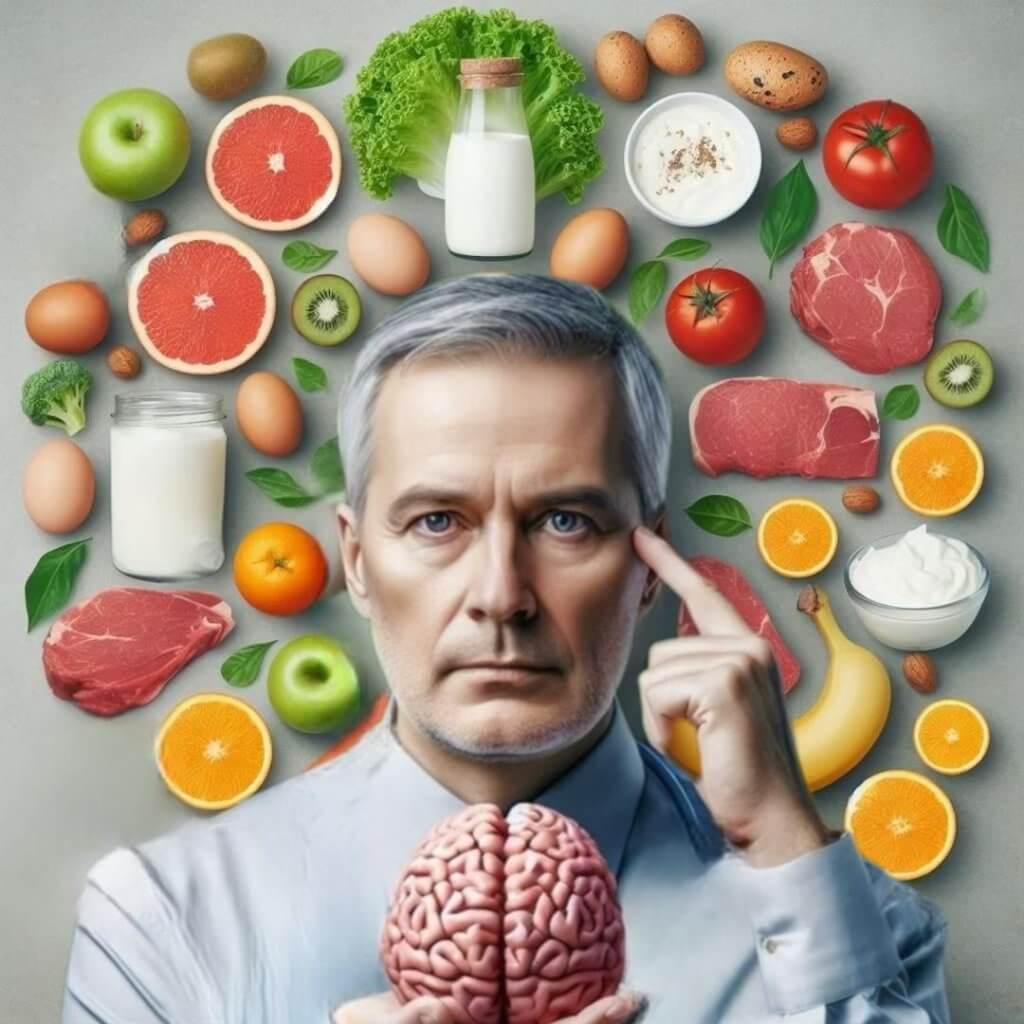
ADHD Nutrition: Simple Strategies for Better Focus
Effective ADHD management requires a balanced approach that integrates medication, nutritional strategies, and lifestyle adjustments. Recent scientific research has shown how specific nutrients can play a critical role in alleviating symptoms like inattention, impulsivity, and emotional regulation. Supplements such as omega-3 fatty acids, magnesium, Vitamin B6, and iron are particularly beneficial for enhancing brain function and mood stability. In this article, we not only summarize the findings but also provide detailed sources and references to add credibility to the content.
For a deeper understanding of ADHD and how it impacts individuals across different life stages, visit What’s ADHD?.
Research Highlights in ADHD Nutrition

Omega-3 Fatty Acids: A Brain-Friendly Boost
Omega-3 fatty acids, particularly EPA (eicosapentaenoic acid) and DHA (docosahexaenoic acid), are essential fats that support cognitive function and emotional regulation. These fatty acids are commonly found in fish like salmon, walnuts, and flaxseeds.
- Research Basis: A meta-analysis published in the Journal of the American Academy of Child & Adolescent Psychiatry (2020) demonstrated that children with ADHD who received omega-3 supplementation experienced moderate improvements in attention and emotional regulation. These effects were most pronounced in individuals with low baseline levels of omega-3s.
Learn more about how nutrition can complement sleep strategies in ADHD and Sleep Disorders: Breaking the Cycle of Sleeplessness.
Magnesium: The Natural Relaxer
Magnesium helps regulate neurotransmitters like GABA, which play a crucial role in calming the nervous system. This mineral is found in foods such as spinach, almonds, and dark chocolate.
- Research Basis: A study published in Magnesium Research (2016) evaluated children with ADHD and low magnesium levels. Results showed that supplementing magnesium reduced hyperactivity and enhanced sleep quality, particularly for children experiencing stimulant-induced insomnia.
Parents seeking practical ways to help their children thrive can explore ADHD Services for Children.
Vitamin B6: The Mood Balancer
Vitamin B6 supports the production of serotonin and dopamine—chemicals that help regulate emotions and attention. You can find Vitamin B6 in foods like bananas, chicken, and potatoes.
- Research Basis: Research featured in Psychotherapy and Psychosomatics (2018) revealed that Vitamin B6 supplementation reduced impulsive behaviors and improved emotional regulation when combined with cognitive-behavioral therapy for individuals with ADHD.
For additional support on managing emotional sensitivity, visit Navigating Rejection Sensitivity in ADHD.
Iron: Fuel for Energy and Focus
Iron is essential for producing dopamine, a neurotransmitter crucial for focus, motivation, and mood stability. Foods like lentils, spinach, and lean meats are excellent sources.
- Research Basis: According to findings published in Pediatrics (2012), children with ADHD and low ferritin levels (a marker of iron storage) benefited significantly from iron supplementation, experiencing improved energy and focus levels.
For adults seeking ADHD diagnostic services, explore tailored options at ADHD Assessments for Adults.
Probiotics: The Gut-Brain Connection

Your gut health plays a key role in brain function. Probiotics—live, healthy bacteria found in foods like yogurt and kefir—help support a healthy gut microbiome, which in turn can improve cognitive and emotional well-being.
- Research Basis: A 2019 study published in Nutrients assessed the effects of probiotics (Lactobacillus rhamnosus and Bifidobacterium breve) on children with ADHD. The study concluded that improving gut health through probiotics resulted in reduced inflammation and improved behavior.
To understand how ADHD overlaps with autism and other neurodiverse conditions, visit Living in Duality: Navigating Life with ADHD and Autism.
Elimination Diets: Identifying Triggers
Elimination diets help identify specific foods, such as artificial additives or gluten, that may worsen ADHD symptoms in sensitive individuals.
- Research Basis: A 2023 meta-analysis published in the Journal of Child Psychology and Psychiatry demonstrated that dietary changes—such as a few-foods diet—resulted in significant behavioral improvements in children diagnosed with ADHD.
Read more about tailoring dietary plans to support ADHD in Journey to Understanding Autism and ADHD.
Foods to Avoid for ADHD: Triggers That May Worsen Symptoms

While focusing on nutrient-rich foods is essential for ADHD management, it’s equally important to identify and limit or avoid certain foods and ingredients that can exacerbate symptoms. Research highlights the following as foods to watch out for:
1. Sugary Foods and Drinks: Energy Spikes and Crashes
Excessive sugar consumption, commonly found in candies, sodas, and desserts, can cause sudden spikes in energy levels followed by rapid drops. This cycle can intensify hyperactivity, impulsivity, and difficulty focusing, especially in children with ADHD.
2. Processed Foods with Artificial Additives
Processed snacks and meals often contain artificial colors (e.g., Yellow No. 5, Red No. 40) and preservatives that have been linked to worsened hyperactivity in some individuals with ADHD. Avoiding heavily processed foods can reduce the likelihood of triggering these effects.
3. Caffeine: Restlessness and Sleep Disruption
Caffeine, found in energy drinks, coffee, and some teas, can heighten restlessness and anxiety while disrupting sleep patterns. Since individuals with ADHD often struggle with sleep, limiting caffeine is particularly beneficial.
4. Trans Fats: Impact on Brain Health
Foods like fried items, chips, and packaged baked goods that contain trans fats can negatively affect brain health and emotional regulation. Opting for healthy fats instead, such as those found in avocados and nuts, is a smarter choice.
5. Gluten and Dairy (For Sensitive Individuals)
For some individuals with ADHD, gluten and dairy may act as triggers. While this is not universal, an elimination diet can help determine whether avoiding these foods improves symptoms like inattention or mood instability.
6. High-Sodium Foods: Mood and Behavior
Excessive salt intake, often found in fast food and processed snacks, has been associated with increased irritability and behavioral issues. Lowering sodium consumption supports overall health and emotional balance.
By avoiding these foods and replacing them with healthier options, individuals with ADHD can create a dietary foundation that supports better focus, mood regulation, and overall well-being. Combining this approach with the recommended nutrient-rich foods amplifies the positive impact of dietary strategies on ADHD symptoms
Practical Nutrition Tips to Get Started
- Omega-3s: Include salmon or walnuts in weekly meals.
- Magnesium: Snack on roasted almonds or enjoy spinach-based dishes.
- Vitamin B6: Add bananas to breakfast or serve potatoes with dinner.
- Iron: Pair iron-rich spinach with Vitamin C (like lemon juice) to boost absorption.
- Probiotics: Add yogurt or kefir to your daily diet.
Tailored Recommendations for Families and Professionals
For Parents
- Introduce small changes to meals, such as incorporating omega-3-rich fish or magnesium-packed snacks.
- Keep a journal to track improvements in your child’s focus, mood, and energy.
- Consult with a pediatrician before introducing supplements.
For Adults
- Make gradual changes that suit your lifestyle, like replacing sugary snacks with nuts or yogurt.
- Pair healthy eating with regular exercise or mindfulness practices for enhanced benefits.
For Healthcare Providers
- Consider testing nutrient levels in ADHD patients, especially for deficiencies in iron, magnesium, and omega-3s.
- Provide families with simple, actionable meal suggestions based on research findings.
Conclusion and Call to Action
Scientific research underscores the importance of nutrition in ADHD management. Incorporating foods like salmon, spinach, and yogurt into your meals—or adding targeted supplements—can lead to noticeable improvements in focus, behavior, and energy.
If you’re ready to take the next step in managing ADHD, start by consulting a healthcare provider to create a personalized nutrition plan. For professional ADHD assessments and support, visit Our Services. Small dietary changes today can lead to lasting improvements tomorrow!



